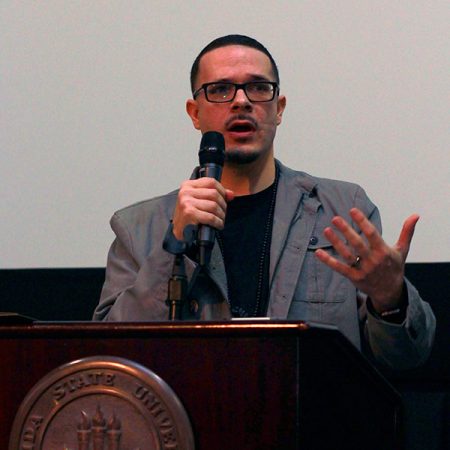
Students left the Multicultural Leadership Summit Saturday afternoon with new energy and ideas for social change.
About 200 people attended the two-day summit hosted by Florida State University’s Center for Leadership & Social Change. The goal of the annual event is to educate students about diversity and multiculturalism and empower them to be agents of social change in an increasingly diverse and global community.
This year’s summit, “Lives, Liberties, and the Politics of Happiness” focused on allyship, advocacy and activism and how they relate to particular social justice issues.
Shaun King, senior justice writer for the New York Daily News and activist for the Black Lives Matter movement, talked in his keynote address about his views on humanity’s struggle for power and safety and how that relates to activism.
“Good and evil will always exist,” he said, “but when we don’t get in the way of evil and let it continue unabated, it grows and grows and grows.”
King offered “tried and tested” advice to the group of students in his keynote address.
The first step, he told them, “Don’t be overwhelmed by the amount of injustice in the world.”
There can be a tendency, King said, for people to feel so overwhelmed by the work to be done that they do nothing instead.
“As best as you can,” he told the students, “don’t lose your heart for justice because there’s so much injustice … don’t allow the volume or the magnitude of America’s problems to keep you from feeling like you can play some part in the solution.”
King also advised seeing the world, learning about other cultures that may have solutions to our problems.
“Instead of doing 10 things, fighting for 10 causes and doing OK at all of them, I would strongly encourage you to pick one and crush it.”
That cause, he said, could be one charity, one cause or even one child.
Mentors, he said, can decide, “I’m going to pour my heart, my soul, everything I have into changing this one person’s life.”
King advised the room to have a set of clear, thought-out principles from which to operate.
“Because you’re going to find yourself in situations, big and small, public and private, where if you have not thought through those principles,” he said, “you’re going to find yourself … compromising in ways you never would have if you had thought out ‘What do I really stand for, and how do those principles makes sense in the real world?’”
With King’s message fresh on their minds, students attended breakout sessions on issues related to allyship, advocacy and activism, including how to be an LGBT ally, hypermasculinity viewed through comics and their movies, intersections of identity, how to use social media for advocacy work, objectification of women and how to build a black liberation movement on college campuses.


Breaks offered students opportunities to register to vote at a Rock the Vote information booth and join the center’s Spiritual Life Project to relax and rejuvenate in the middle of the hectic day by coloring or walking a labyrinth.
Bri’Anna Collins, a sophomore, attended the summit for the first time. She has an interest in intersectional feminism dating back to high school that sparked her movement toward social justice work. One of the highlights for Collins was a session on coping with racial battle fatigue as an activist.
“I definitely resonate with the messages they were talking about because being a part of a social justice movement can definitely be tiring and you can definitely experience some kind of fatigue, whether it’s racial or sexist fatigue,” Collins said. “So to talk about that around other people who are feeling the same things was very validating and valuable for me.”
Austin Crawford, a senior attending for the first time, said he’d be recommending the summit to friends next year.
“It was a great opportunity for me to engage with people I had never met before and didn’t know and engage in a very safe place, a very civil environment,” Crawford said. "It was a great way for us to begin breaking down walls, for us to self-reflect and learn about others before coming in today.”
In the concurrent sessions, he said, he was able to learn about issues that interested him, including one on dismantling the labels assigned to people with disabilities.
“As someone who is considered able-bodied,” he said, “it was interesting for me to engage people living with disabilities in a productive way that I was able to expand my perspective.”
Crawford said he’d definitely be back next year.
“I look forward to the opportunity to engage with people like this again.”




